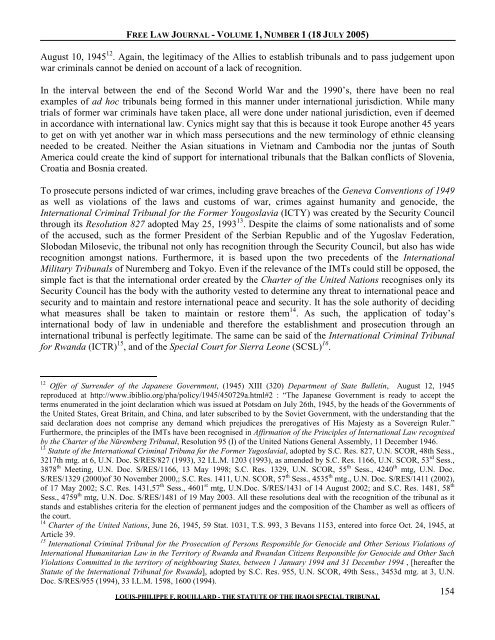Free_Law_Journal-Vol.. - Free World Publishing Inc.
Free_Law_Journal-Vol.. - Free World Publishing Inc.
Free_Law_Journal-Vol.. - Free World Publishing Inc.
You also want an ePaper? Increase the reach of your titles
YUMPU automatically turns print PDFs into web optimized ePapers that Google loves.
FREE LAW JOURNAL - VOLUME 1, NUMBER 1 (18 JULY 2005)<br />
August 10, 1945 12 . Again, the legitimacy of the Allies to establish tribunals and to pass judgement upon<br />
war criminals cannot be denied on account of a lack of recognition.<br />
In the interval between the end of the Second <strong>World</strong> War and the 1990’s, there have been no real<br />
examples of ad hoc tribunals being formed in this manner under international jurisdiction. While many<br />
trials of former war criminals have taken place, all were done under national jurisdiction, even if deemed<br />
in accordance with international law. Cynics might say that this is because it took Europe another 45 years<br />
to get on with yet another war in which mass persecutions and the new terminology of ethnic cleansing<br />
needed to be created. Neither the Asian situations in Vietnam and Cambodia nor the juntas of South<br />
America could create the kind of support for international tribunals that the Balkan conflicts of Slovenia,<br />
Croatia and Bosnia created.<br />
To prosecute persons indicted of war crimes, including grave breaches of the Geneva Conventions of 1949<br />
as well as violations of the laws and customs of war, crimes against humanity and genocide, the<br />
International Criminal Tribunal for the Former Yougoslavia (ICTY) was created by the Security Council<br />
through its Resolution 827 adopted May 25, 1993 13 . Despite the claims of some nationalists and of some<br />
of the accused, such as the former President of the Serbian Republic and of the Yugoslav Federation,<br />
Slobodan Milosevic, the tribunal not only has recognition through the Security Council, but also has wide<br />
recognition amongst nations. Furthermore, it is based upon the two precedents of the International<br />
Military Tribunals of Nuremberg and Tokyo. Even if the relevance of the IMTs could still be opposed, the<br />
simple fact is that the international order created by the Charter of the United Nations recognises only its<br />
Security Council has the body with the authority vested to determine any threat to international peace and<br />
security and to maintain and restore international peace and security. It has the sole authority of deciding<br />
what measures shall be taken to maintain or restore them 14 . As such, the application of today’s<br />
international body of law in undeniable and therefore the establishment and prosecution through an<br />
international tribunal is perfectly legitimate. The same can be said of the International Criminal Tribunal<br />
for Rwanda (ICTR) 15 , and of the Special Court for Sierra Leone (SCSL) 16 .<br />
12 Offer of Surrender of the Japanese Government, (1945) XIII (320) Department of State Bulletin, August 12, 1945<br />
reproduced at http://www.ibiblio.org/pha/policy/1945/450729a.html#2 : “The Japanese Government is ready to accept the<br />
terms enumerated in the joint declaration which was issued at Potsdam on July 26th, 1945, by the heads of the Governments of<br />
the United States, Great Britain, and China, and later subscribed to by the Soviet Government, with the understanding that the<br />
said declaration does not comprise any demand which prejudices the prerogatives of His Majesty as a Sovereign Ruler.”<br />
Furthermore, the principles of the IMTs have been recognised in Affirmation of the Principles of International <strong>Law</strong> recognised<br />
by the Charter of the Nüremberg Tribunal, Resolution 95 (I) of the United Nations General Assembly, 11 December 1946.<br />
13 Statute of the International Criminal Tribuna for the Former Yugoslavial, adopted by S.C. Res. 827, U.N. SCOR, 48th Sess.,<br />
3217th mtg. at 6, U.N. Doc. S/RES/827 (1993), 32 I.L.M. 1203 (1993), as amended by S.C. Res. 1166, U.N. SCOR, 53 rd Sess.,<br />
3878 th Meeting, U.N. Doc. S/RES/1166, 13 May 1998; S.C. Res. 1329, U.N. SCOR, 55 th Sess., 4240 th mtg, U.N. Doc.<br />
S/RES/1329 (2000)of 30 November 2000,; S.C. Res. 1411, U.N. SCOR, 57 th Sess., 4535 th mtg., U.N. Doc. S/RES/1411 (2002),<br />
of 17 May 2002; S.C. Res. 1431,57 th Sess., 4601 st mtg, U.N.Doc. S/RES/1431 of 14 August 2002; and S.C. Res. 1481, 58 th<br />
Sess., 4759 th mtg, U.N. Doc. S/RES/1481 of 19 May 2003. All these resolutions deal with the recognition of the tribunal as it<br />
stands and establishes criteria for the election of permanent judges and the composition of the Chamber as well as officers of<br />
the court.<br />
14 Charter of the United Nations, June 26, 1945, 59 Stat. 1031, T.S. 993, 3 Bevans 1153, entered into force Oct. 24, 1945, at<br />
Article 39.<br />
15 International Criminal Tribunal for the Prosecution of Persons Responsible for Genocide and Other Serious Violations of<br />
International Humanitarian <strong>Law</strong> in the Territory of Rwanda and Rwandan Citizens Responsible for Genocide and Other Such<br />
Violations Committed in the territory of neighbouring States, between 1 January 1994 and 31 December 1994 , [hereafter the<br />
Statute of the International Tribunal for Rwanda], adopted by S.C. Res. 955, U.N. SCOR, 49th Sess., 3453d mtg. at 3, U.N.<br />
Doc. S/RES/955 (1994), 33 I.L.M. 1598, 1600 (1994).<br />
154<br />
LOUIS-PHILIPPE F. ROUILLARD - THE STATUTE OF THE IRAQI SPECIAL TRIBUNAL
















